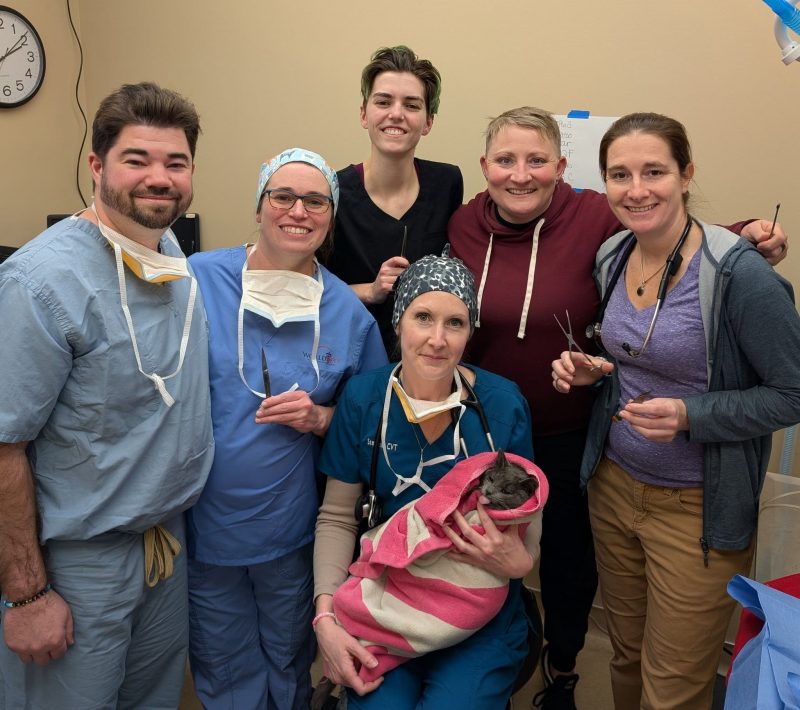
Written by Dr. Anna, Camden Pet Hospital
This beautiful warmer weather and increase in sunlight not only brings neon green buds and fresh sprigs of life emerging, it also incites a twitterpated annual revival of hormones and a need to breed in nature. It is all well and good when we see the birds vying for the attention of a mate, but it’s not so great when we see our domesticated pets out on the prowl.
Cats, in particular, are surprisingly good at finding one another and that leads to one of two things, either injuries from fighting and roaming, or more outside kitties being born. Neither of these things are good for the animals — the cats, or the wild bird population too for that matter!
As we all know, there are a lot of risks to a cat that is allowed to be outside. Parasites are in the soil and environment, and it is almost guaranteed that a cat spending any time outside will be riddled with parasites in no time; intestinal worms especially, as well as fleas, and nasty little ear mites. Predators are another risk, in our area it’s mostly birds of prey, we occasionally have a coyote wander in and around our neighborhood but not too often. The most common predator though? The car. It is horrifying to see a cat on the side of the street hit by a vehicle and it is all too common an occurrence.
One of the biggest concerns with cats being outside is the spread of disease, most notably several very serious life-long immune system diseases. Feline Immunodeficiency Virus (FIV), most simply explained is like a cat version of HIV. It’s debilitating and usually causes the cat to struggle and suffer from poor health and eventually succumb to some secondary infection that their weakened immune system just cannot fight. FIV cats frequently have severe and chronic skin disease, GI disease and terrible painful oral lesions as well. The other infectious disease cats spread to one another is Feline Leukemia Virus (FeLV). Yes, that’s right, leukemia is a virus in cats… think about that, this terrible white blood cell cancer that we know of in the human world – now imagine it as a contagious disease! Well, that’s absolutely what it is in cats. There’s much more nuance to FeLV than I can explain in this column, but for what we should all know and remember, it’s a pretty terrible disease that cats can spread to one another.
So what’s the best way to prevent these diseases that cause suffering in our cat population? First and foremost, keep your kitties indoors! If they go outside at all, use a harness and leash or use cat fencing to create a ‘catio’ and be sure they are on a good total parasite control preventative.
Second, help support outdoor cat control however you can. Outside cats should ideally have a break-away collar for safety with a bright color and a jingle bell so the bird population is less at risk from their hunting. They should hopefully have a microchip as well! If a cat is friendly, but has no collar and has no microchip, you can set up an appointment with a local humane society or rescue to hopefully get that kitty into a responsible home!
Camden Pet has recently partnered with Divine Feline and Pet Project Rescue to help control the outdoor cat population in our area. We have decided to donate our time, our facility and our equipment to host a TNR (Trap, Neuter, Release) program about once a month. This makes a significant impact on the outdoor cat population. Did you know cats can have a litter of 4-10 kittens every 4 months?! That’s a LOT of kitties! We started out in February on Valentines day, doing a “neuter your Ex” campaign where a donation would get you naming rights – we’d name a kitty after your Ex before we neutered him/her. In March, we honed our process and spayed and neutered another 20 stray cats from our area, and this coming month, we will host two more TNR days.
If you know of outside cats in your backyard look closely to see if their left ear is shorter- if so, then they have been neutered! If not, and you’d like to help get these kitties fixed, contact petprojectrescue@gmail.com. It takes a community to truly tackle this issue and the more people we have helping, the more successful we can be. If you would like to help try and tame some of these feral cats and get them to a humane society or rescue instead of going back outside, we would welcome your efforts as well!
Thanks to all you animal lovers out there as always!


